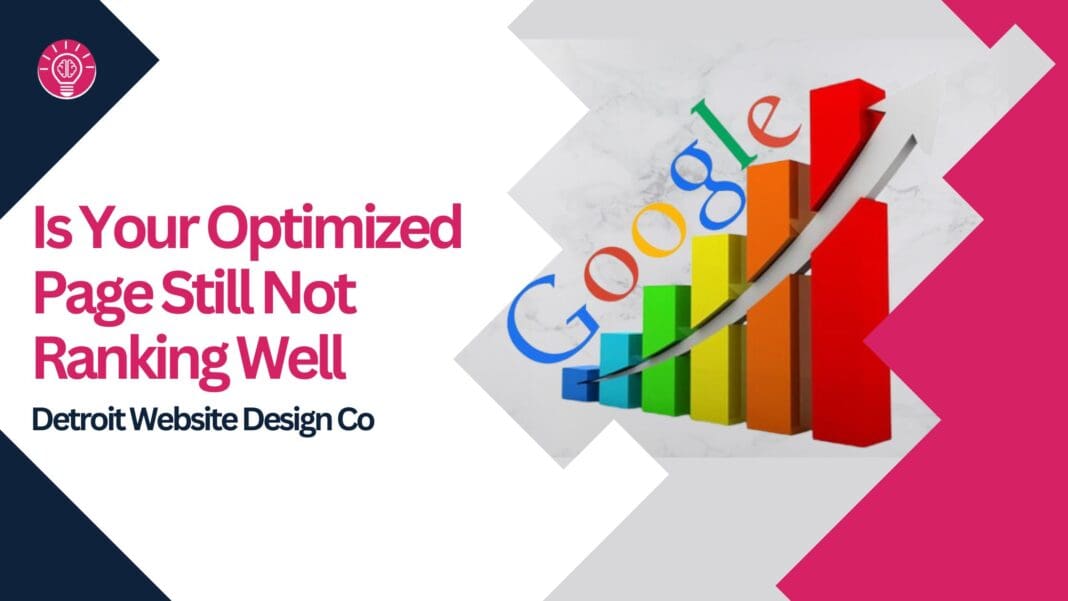As a small business owner, you understand the importance of having a strong online presence. You’ve put in the time and effort to optimize your website: researching the right keywords, creating valuable content, improving your site’s user experience, and ensuring mobile compatibility. But when you look at your search engine rankings, your page just isn’t where you want it to be. It’s frustrating, isn’t it?
At Detroit Website Design Co, we’ve worked with many small businesses who’ve found themselves in the same boat. They’ve done everything “right” with SEO, yet their pages aren’t performing as expected. The reality is, SEO is complex, and ranking issues can stem from a variety of factors—some obvious, others more technical. But don’t worry. We’re here to break it down for you.
In this guide, we’ll explore the most common reasons why your optimized page might not be ranking and, more importantly, what you can do to fix it. From indexing problems to content strategy, we’ll walk you through the steps to troubleshoot and improve your site’s SEO performance. Let’s dive in!
1. Indexing and Crawlability Issues
It’s one thing to optimize your page with great content and solid SEO tactics, but what if Google can’t even find your page in the first place? Indexing and crawlability are critical steps in SEO that determine whether search engines can access and properly index your site.
If Googlebot can’t crawl your pages or if certain pages are blocked from indexing, your site will never show up in search results. Even though your content may be top-notch, it can’t help your rankings if search engines can’t access it.
Common Issues:
- Blocked Pages: You might accidentally block important pages from being crawled by search engines using robots.txt or meta tags.
- Slow Crawl Rate: If your site is too large or complicated, search engines may not be able to crawl all of your pages efficiently.
What You Can Do About It:
- Check Your Robots.txt: Use tools like Google Search Console to ensure that your key pages aren’t accidentally blocked by robots.txt.
- Submit Your Sitemap: Submit an updated XML sitemap to Google to help it find and index your pages more efficiently.
- Fix Crawl Errors: Regularly check for crawl errors in Google Search Console and address them promptly to keep your site accessible.
2. Technical SEO Problems
Technical SEO is often the unseen hero of your SEO strategy. While content and backlinks are important, technical SEO is what ensures that search engines can crawl, index, and understand your website correctly. Issues with site structure, mobile-friendliness, or page speed can all negatively impact your rankings.
Common Technical SEO Problems:
- Slow Loading Speed: A slow website frustrates users and search engines alike. Google has made page speed a ranking factor, meaning slower sites will be penalized.
- Mobile Unfriendliness: With mobile-first indexing, Google gives preference to websites that are optimized for mobile devices. If your site isn’t mobile-friendly, it could hurt your rankings.
- Broken Links and 404 Errors: If users or search engines come across broken links, it can damage your site’s authority.
What You Can Do About It:
- Improve Site Speed: Use tools like Google PageSpeed Insights to check your page load speed. Compress images, enable caching, and reduce unnecessary scripts to speed things up.
- Mobile Optimization: Ensure your website is responsive and delivers a great experience on mobile devices. This is crucial for both user experience and SEO.
- Fix Broken Links: Regularly check for 404 errors and redirect broken links to relevant pages to keep both users and search engines happy.
3. Link Building and Backlinking Issues
Backlinks (links from other websites to yours) are a critical ranking factor. They act as endorsements, signaling to Google that your website is trustworthy and authoritative. If you’re not getting enough backlinks, or worse, if your backlinks are from low-quality or irrelevant sites, it could hinder your rankings.
Common Link Building Issues:
- Lack of Backlinks: If your website is new or hasn’t earned many backlinks, you may struggle to rank for competitive keywords.
- Low-Quality Backlinks: Getting links from low-authority or spammy websites can harm your site’s credibility and hurt your rankings.
What You Can Do About It:
- Build Quality Backlinks: Focus on earning backlinks from authoritative and relevant websites in your industry. This could include guest blogging, creating shareable content like infographics, or building relationships with influencers.
- Monitor Your Backlink Profile: Use tools like Ahrefs or Moz to track your backlinks. Disavow any toxic backlinks that may be harming your website’s reputation.
4. Content and Keyword-Related Issues
You’ve probably heard the phrase “content is king”—and it’s true. But even if your content is valuable, it might not be ranking because of keyword-related issues. Keyword research is the foundation of SEO, and using the right keywords in your content helps search engines understand your page.
Common Content Issues:
- Keyword Stuffing: Overloading your content with keywords can harm your rankings and make your content seem unnatural. It’s about finding the right balance.
- Thin Content: If your content doesn’t fully address the user’s search intent or is too short, it can struggle to rank.
- Not Targeting the Right Keywords: Even if your keywords have good search volume, if they aren’t aligned with what your audience is actually searching for, your content won’t perform.
What You Can Do About It:
- Use Long-Tail Keywords: These are more specific phrases that have lower competition and can drive more qualified traffic.
- Focus on Content Quality: Instead of focusing solely on keywords, make sure your content answers the questions users are asking and provides value.
- Perform Keyword Research Regularly: Use tools like SEMrush or Google Keyword Planner to find the right keywords for your audience and optimize your content accordingly.
5. Google SEO Algorithm Changes and Penalties
Google’s algorithms are constantly evolving. What worked in the past may not work today, and sometimes, changes can result in ranking drops. Google’s updates can sometimes penalize sites that use outdated or spammy tactics.
Common Issues:
- Algorithm Changes: Google frequently releases updates that can affect how pages are ranked. If your site hasn’t kept up with the latest SEO best practices, it might drop in rankings.
- Penalties: If your site engages in black-hat SEO practices like keyword stuffing or link farming, you could be penalized by Google.
What You Can Do About It:
- Stay Updated on Algorithm Changes: Follow Google’s official updates or trusted SEO blogs to stay informed about what’s changing in SEO.
- Focus on White-Hat SEO: Stick to ethical SEO practices that focus on providing value and building trust with your audience.
- Check for Penalties: Use Google Search Console to monitor your site for penalties. If you’ve been penalized, identify the issue and make the necessary changes.
6. How Do You Know if Your Content/Site Is Performing Well in the First Place?
If you’re not tracking your SEO performance, how do you know if your efforts are paying off? Measuring your website’s performance is key to understanding what’s working and what needs improvement.
Key Metrics to Track:
- Organic Traffic: How many visitors are coming to your site through search engines?
- Click-Through Rate (CTR): How often do users click on your page when it appears in search results?
- Conversion Rate: How many of those visitors are taking the desired action (buying a product, signing up for a newsletter)?
What You Can Do About It:
- Set Up Google Analytics: This tool is free and allows you to track your site’s traffic, behavior, and conversions.
- Monitor Your Rankings: Use tools like Ahrefs or Moz to track your rankings for specific keywords.
7. How Can You Track User Engagement Metrics?
User engagement metrics give you insights into how visitors are interacting with your content. High engagement rates signal to Google that your content is valuable, which can positively impact your rankings.
Key Engagement Metrics:
- Bounce Rate: A high bounce rate indicates that users aren’t finding what they need or that your site’s UX needs improvement.
- Pages Per Session: The more pages a user visits, the more engaged they are.
- Time on Site: If users are spending a lot of time on your site, it’s a good sign that they find your content engaging.
What You Can Do About It:
- Improve Content Quality: Make sure your content is engaging and answers the user’s search intent.
- Optimize User Experience: Streamline your site’s navigation and ensure it’s easy to find relevant information.
8. Is Your Optimized Page Still Not Ranking Well?
You’ve done everything right: optimized your content, selected the best keywords, and improved user experience. But despite all your hard work, your page still isn’t ranking as it should. So, what’s the problem?
At Detroit Website Design Co, we understand the frustration that comes with SEO troubles. We also know that SEO isn’t a one-size-fits-all solution—it requires continuous tweaks and sometimes even expert-level intervention. If your page still isn’t performing despite all the optimizations, it’s time to take a closer look at some possible issues.
Get Your Site Optimized by the Pros
While DIY SEO is a great way to get started, there comes a point when seeking professional SEO expertise is the most effective strategy. There’s no shame in reaching out to SEO professionals—after all, SEO is an art and a science, and sometimes you need a pro to unlock the full potential of your website.
Detroit Web Design Co. offers in-depth technical audits, SEO consulting, and strategies tailored specifically for small businesses looking to improve their rankings. We provide holistic SEO strategies that don’t just focus on optimizing a page for search engines but on creating long-term success that drives traffic and conversions.
Here’s How We’ve Helped Clients Like You
Don’t just take our word for it—look at the success stories of clients who have seen remarkable improvements after working with us:
- 360% increase in organic traffic year-over-year
- 88% increase in ad clicks, driving more engagement and higher conversions
- 352% increase in Facebook impressions, expanding brand visibility
- 100% increase in LinkedIn followers, boosting professional connections
By implementing a holistic SEO strategy, we’ve helped businesses reach their full potential and grow their online presence exponentially.
Contact Detroit Web Design Co. Today
You could be our next success story. If you’re still wondering why your page isn’t ranking despite your SEO efforts, it’s time to partner with a team that understands both the technical and creative aspects of SEO. We’ll identify the gaps, fix them, and optimize your site for sustainable growth.
Let’s take your business to the next level! Contact Detroit Website Design Co today to start a conversation about your unique SEO strategy and watch your website’s rankings soar.








